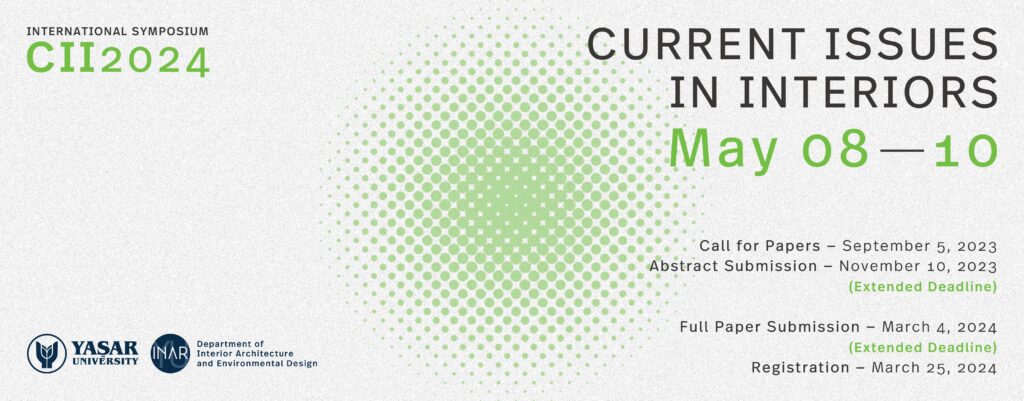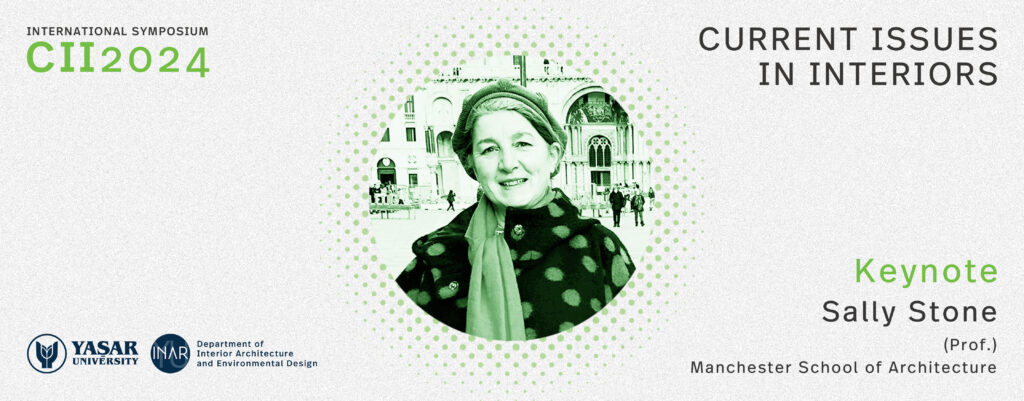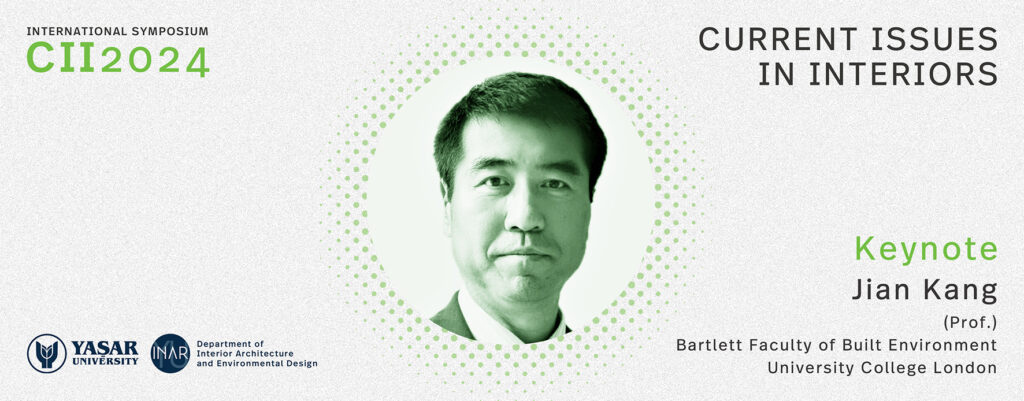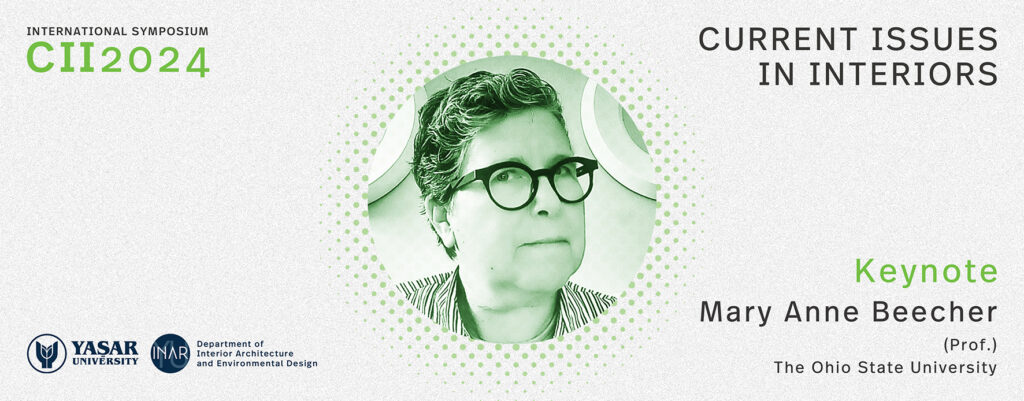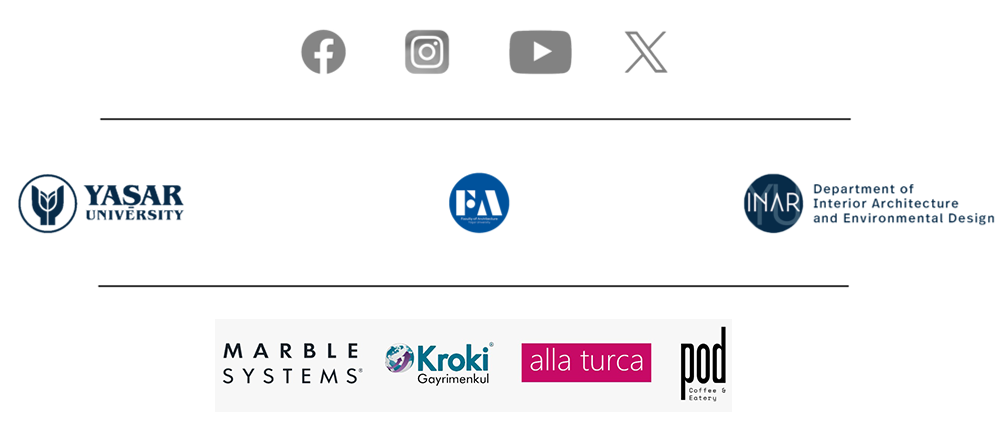
Current Issues in Interiors [CII] 2024 Symposium
Call for Papers
Current Issues in Interiors [CII] 2024 Symposium
8-10 May 2024
Yaşar University
Faculty of Architecture
Department of Interior Architecture and Environmental Design
Hybrid (Yaşar University Campus [İzmir, Turkey] and Zoom Platform)
Current Issues in Interiors [CII] 2024 Symposium aims to bring together leading academicians, researchers, students, and vendors to share experiences and research results on several aspects of interior architecture and design, including adaptive reuse for interiors, design and culture, environment and behavior, environmental systems, and technology. Prospective authors and participants are kindly invited to do the CII Symposium of the honor of submitting their research abstracts and papers. Through the submitted abstracts and papers, this symposium targets an interdisciplinary research and discussion environment by taking interior architecture and design as its main focus.
Track 1: Adaptive Reuse for Interiors
In this track, we aim to bring together researchers from different fields to discuss theory and practice in adaptive reuse of existing buildings and the urban fabric, and to exchange ideas and share experiences. A major research and implementation field in spatial practice is the adaptation of cultural heritage for contemporary uses. The complexity of relations like harmony and contrast that must be established using historical/contextual data makes the redesign of historical buildings very problematic. On the other hand, the rich tangible and intangible data in existing buildings and environments inspire contemporary intervention designs and has encouraged a wide diversity in current design approaches. We welcome proposals covering theory, history, practice, and education of adaptive reuse of interiors.
Themes
- Current approaches in spatial transformation of historic interiors
- Authenticity of the place in terms of adaptive reuse of architectural heritage
- Social, cultural and environmental sustainability in building transformation
- Memory and identity issues in adaptive reuse
- New materiality of existing spaces
- Impact of narratives and intangible cultural values on design of new interiors
- Cultural heritage and interior architecture education
Track 2: Design, Culture, Environment and Behavior
In this track, we aim to create an interdisciplinary sharing environment for contemporary research in interiors by focusing on the theoretical foundations of practices of interior architecture and design, and by synthesizing theoretical and practical knowledge through discussion of issues in design, culture, environment, and behavior. Today, research, projects, and applications involving design, culture, environment, and behavior relations have an essential place within interiors. Accordingly, we offer this track to exchange ideas and benefit from mutual experiences. These may include the contributions of design history studies to the analysis of cultural codes, methods of solving interior spaces serving different uses with contemporary design approaches by providing interdisciplinary cooperation, and analysis of new forms of relationship between behavior and space. We welcome proposals covering theory, history, practice, and/or education regarding expansions and representations of interiors in different disciplines, their solutions in various building types, and their evaluation with current discussions and approaches.
Themes
- Cultural codes in relation to interiors
- Interiors in housing studies/domestic interiors
- Specialized topics in interiors: exhibition design, retail design, healthcare design, etc.
- Interdisciplinary nature of interiors: art, product design, graphic design, fashion, photography, cinema, literature, philosophy
- Urban/public interiors
- Educational tools and tactics for interior architecture and design education
- Historical studies of interiors: spatial reflections of pandemics/epidemics in history, history of modern interiors, interior designers in history
- The body, behavior, and space: environmental psychology, perception of interior spaces, design for aging, queer design, etc.
Track 3: Environmental Systems and Technology
In this track, we aim to attract researchers wishing to contribute to CII in environmental control, construction and technology. The objective of this track is to establish a collaborative platform that encourages the exchange of interdisciplinary ideas and research related to Environmental systems and technology. In interiors, modern technologies such as artificial intelligence, simulations, and experimental methods are utilized to create more comfortable and innovative spaces. However, the task of designing spaces that are both sustainable and healthier has become increasingly challenging. Furthermore, integrating environmental systems into visually appealing designs has proven to be a complex endeavor. We are seeking for proposals covering interior architecture and environmental control, such as green building technologies, indoor comfort, sustainable interiors, building information technologies, and artificial intelligence in design. Additionally, we encourage proposals related to building components and building information modeling.
Themes
- Healthier and safer interiors
- Sustainable interior design, renovations, and green building technologies
- Eco housing, low-energy houses, net zero-energy design
- Passive interior design systems, low-emitting materials
- Indoor comfort; natural lighting, artificial lighting, acoustics, thermal comfort, and occupant wellbeing
- Building components, systems and finishing materials
- Building information technologies and modeling, life cycle and circular construction, automation and robotics, virtual and augmented reality, software development
- Artificial intelligence in interiors
* All accepted full papers will be published in the online Proceeding Book with an ISBN number.
